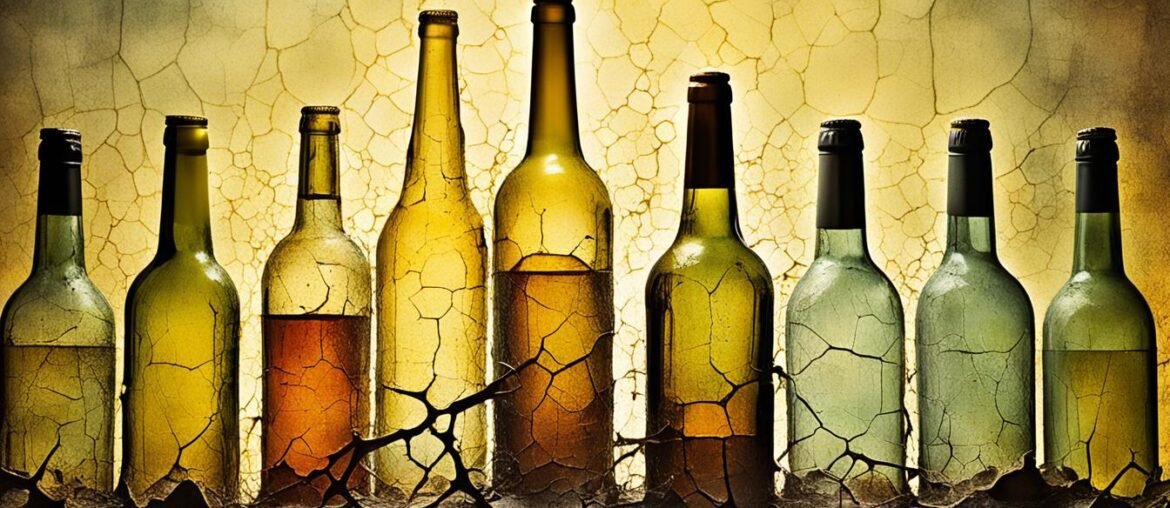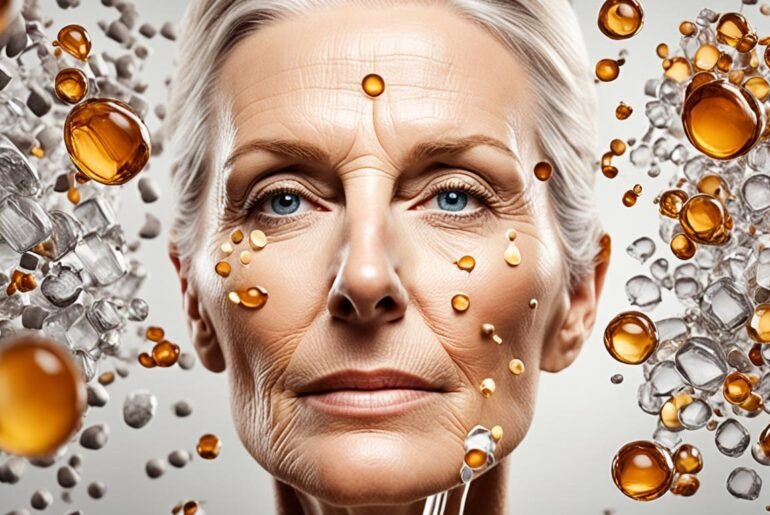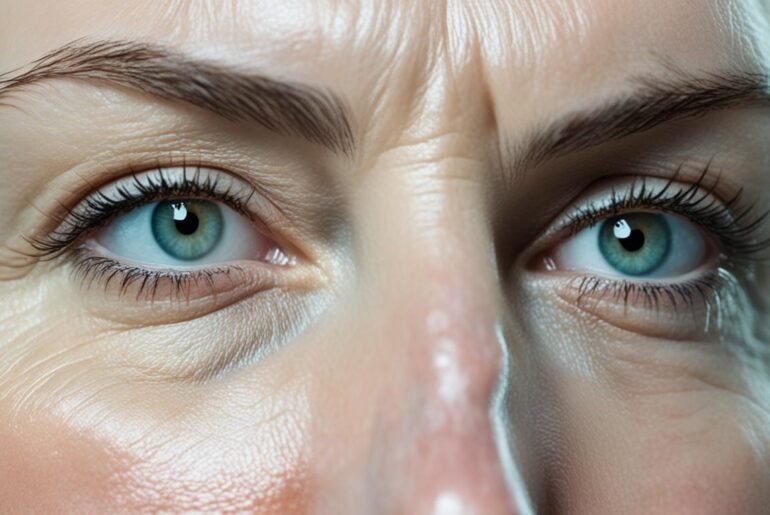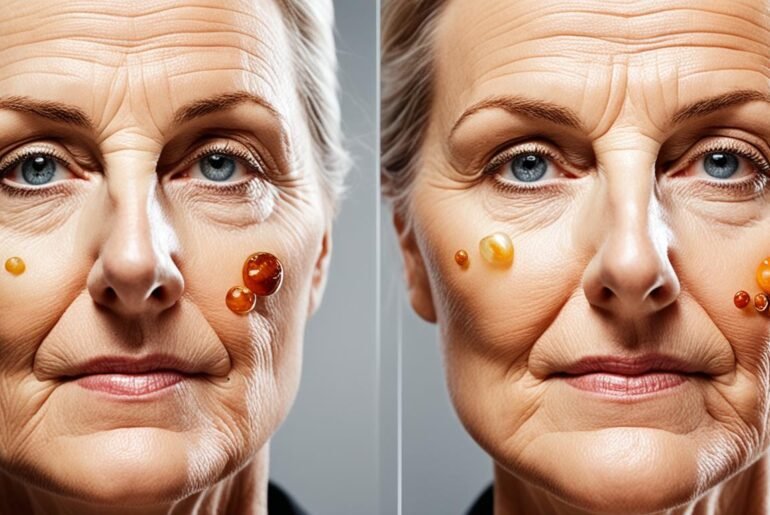Did you know that alcohol consumption can have a significant impact on the aging process of your skin? Studies have shown that excessive alcohol consumption can accelerate skin aging, leading to wrinkles, loss of elasticity, and collagen degradation. Understanding how alcohol affects the skin is essential for maintaining a youthful and healthy appearance.
Key Takeaways:
- Excessive alcohol consumption can speed up the skin aging process.
- Alcohol can contribute to the development of wrinkles, loss of skin elasticity, and collagen degradation.
- Understanding the effects of alcohol on the skin is crucial for maintaining a youthful appearance.
- Practicing moderation and being mindful of alcohol consumption can help minimize the negative effects on the skin.
- Stay hydrated and follow a healthy skincare routine to counteract the aging effects of alcohol.
The Impact of Smoking on Facial Aging
A large multinational study has revealed the detrimental effects of smoking on facial aging. The study found that smoking is associated with increased severity of various facial lines, including forehead lines, crow’s feet, and glabellar lines. Additionally, smoking contributes to under-eye puffiness, tear-trough hollowing, nasolabial folds, oral commissures, perioral lines, and reduced lip fullness. However, it is important to note that smoking does not have a significant impact on midface volume loss or visible blood vessels.
Impact on Facial Lines
“The study highlights the strong correlation between smoking and the development of facial lines. Smokers are more likely to have deeper and more pronounced lines on their forehead, as well as around the eyes and mouth.”
Other Effects of Smoking on Facial Aging
In addition to promoting the formation of facial lines, smoking also contributes to under-eye puffiness and hollowing, making the face appear tired and aged. It leads to the development of nasolabial folds, which are the deep lines that run from the sides of the nose to the corners of the mouth. Smoking can also cause oral commissures or marionette lines, which are the vertical lines that extend downwards from the corners of the mouth.
Furthermore, smoking reduces lip fullness, making the lips appear thinner and less youthful. These effects on facial aging are attributed to the toxins and harmful chemicals present in tobacco smoke, which damage collagen and elastin fibers in the skin, leading to decreased elasticity and firmness.
| Effects of Smoking on Facial Aging | Impact |
|---|---|
| Facial lines (forehead, crow’s feet, glabellar lines) | Increased severity |
| Under-eye puffiness | Prominent |
| Tear-trough hollowing | Visible |
| Nasolabial folds | More pronounced |
| Oral commissures (perioral lines) | Deeper lines |
| Reduced lip fullness | Thinner appearance |
The Effects of Alcohol on Facial Aging
Research has shown that heavy alcohol consumption can have significant effects on facial aging. In a study examining the impact of alcohol consumption on facial aging, it was found that individuals who consumed 8 or more drinks per week experienced several negative changes in their facial appearance.
One of the noticeable effects of alcohol consumption was an increase in upper facial lines. These lines, often found around the eyes and forehead, can contribute to an aged and tired appearance. Additionally, under-eye puffiness was observed in individuals who consumed alcohol heavily, further detracting from a youthful and vibrant look.
Alcohol consumption was also linked to oral commissures, the lines or folds that develop around the mouth. These lines can make individuals appear older and contribute to a less youthful appearance.
Another notable impact of heavy alcohol use on facial aging was midface volume loss. The midface, which includes the cheeks and the area below the eyes, can lose volume over time due to age-related changes. However, alcohol consumption was found to exacerbate this loss, resulting in a more sunken and hollow appearance.
Visible blood vessels were also more prevalent in individuals who consumed alcohol heavily. These blood vessels, often noticeable on the nose and cheeks, can contribute to a flushed and aged look.
It is worth noting, however, that alcohol consumption did not have a significant impact on forehead lines or crow’s feet, two common signs of aging on the face.
To summarize, heavy alcohol use can accelerate the aging process and lead to various negative effects on facial appearance. From upper facial lines and under-eye puffiness to oral commissures and midface volume loss, the impact of alcohol consumption on facial aging is evident. It is important to be mindful of the potential consequences of alcohol on skin health and overall well-being.
Alcohol and Skin Dehydration
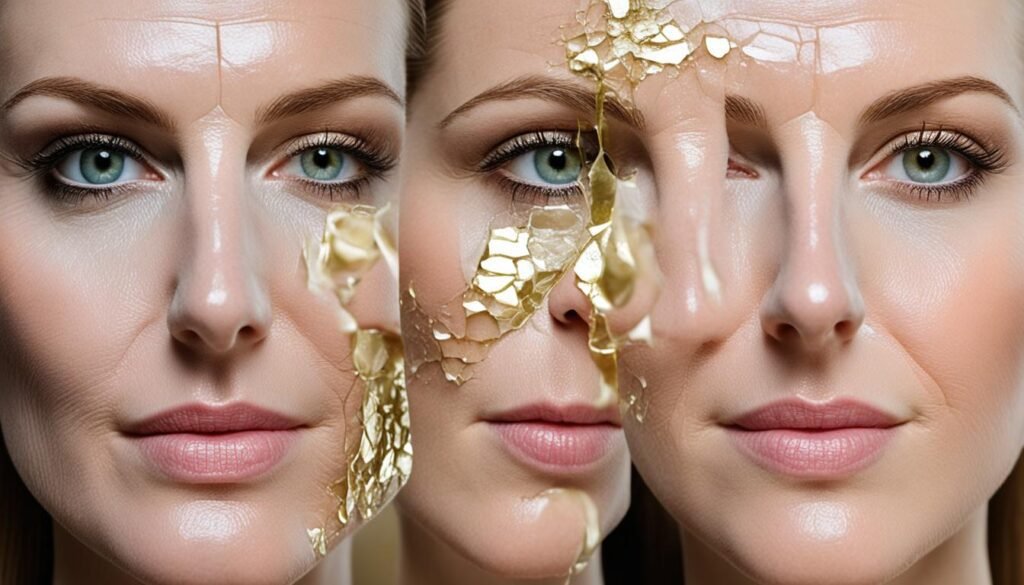
As people age, their bodies naturally have less water, and alcohol can further dehydrate the body. Drinking alcohol can lead to increased dehydration, which can have a negative impact on the skin.
When alcohol is consumed, it acts as a diuretic, causing an increase in urine production and promoting fluid loss from the body. This can disrupt the body’s natural hydration balance and contribute to dehydration. Dehydration can manifest in various forms, including dry skin, dull complexion, and increased sensitivity.
Dehydration can impair the skin’s barrier function, making it more susceptible to external factors such as environmental pollutants and UV radiation. It can also disrupt the skin’s natural moisturizing mechanisms, leading to a decrease in skin elasticity and firmness.
To illustrate the impact of alcohol on skin dehydration, consider the following table:
| Alcohol Consumption | Effects on Skin Dehydration |
|---|---|
| Regular, moderate consumption | May cause mild dehydration, potentially leading to dry skin |
| Excessive, heavy consumption | Significantly increases dehydration, leading to severe dryness and potential skin damage |
It is essential to prioritize proper hydration by drinking an adequate amount of water alongside any alcohol consumption to help counteract the dehydrating effects. Hydrating skincare products can also be beneficial in maintaining skin moisture levels and preventing dehydration.
Alcohol and Skin Dryness
As the skin naturally becomes thinner and drier with age, alcohol consumption can exacerbate this process. Alcohol can dehydrate the skin, leading to increased dryness and potentially accelerating the aging process.
When alcohol enters the bloodstream, it causes blood vessels to constrict and reduces blood flow to the skin. This reduction in blood flow deprives the skin of essential nutrients and moisture, resulting in dry and dull skin.
“The dehydrating effects of alcohol can disrupt the skin’s natural barrier function, leading to excessive water loss and skin dryness,” says Dr. Emma Martinez, a dermatologist at New York Dermatology Clinic.
To further illustrate the impact of alcohol on skin dryness, consider the following table:
| Factors | Impact |
|---|---|
| Alcohol consumption | Increases skin dehydration |
| Thinning and drying of skin with age | Natural process |
| Combination of alcohol consumption and aging | Exacerbates skin dryness and accelerates the aging process |
This table clearly demonstrates how the combination of alcohol consumption and natural aging processes can have a substantial impact on skin dryness. It emphasizes the importance of maintaining optimal hydration levels and minimizing alcohol consumption to preserve the skin’s moisture content.
It is worth mentioning that chronic alcohol abuse can also lead to nutritional deficiencies, such as deficiencies in vitamins A and E, which are crucial for skin health and hydration.
By minimizing alcohol intake and prioritizing proper hydration, individuals can help mitigate the detrimental effects of alcohol on skin dryness. Next, we will explore the impact of alcohol on organ function and overall well-being.
Alcohol and Organ Function
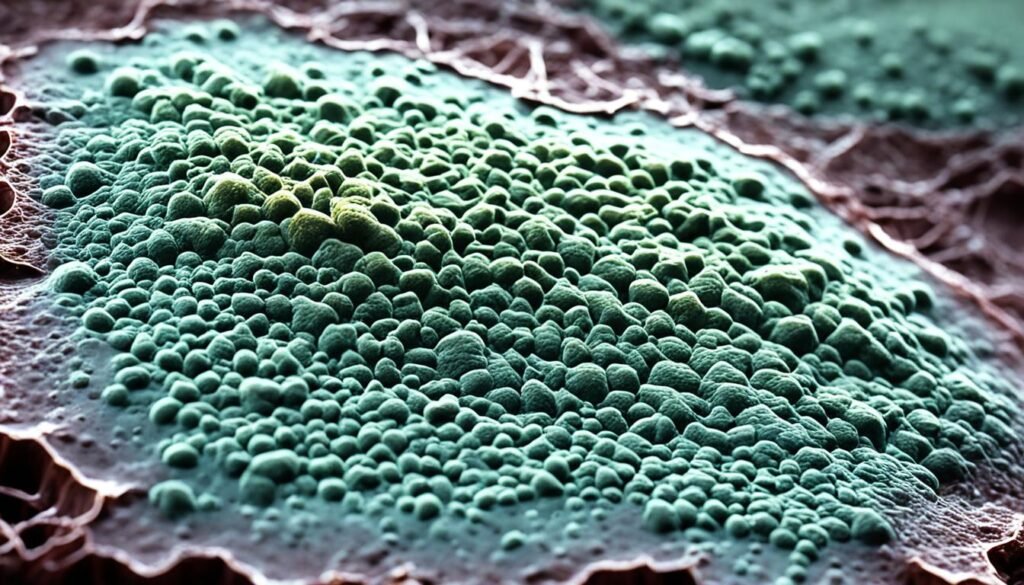
Excessive alcohol consumption can have detrimental effects on organ function, particularly the liver and kidneys. The impact of alcohol on these vital organs can lead to serious health issues and complications.
Liver Damage:
The liver is responsible for processing alcohol and removing toxins from the body. However, heavy drinking can overwhelm the liver, causing inflammation and damage over time. This can lead to conditions such as alcohol-related liver disease and fatty liver disease.
Kidney Function:
In addition to the liver, alcohol can also impair kidney function. The kidneys play a crucial role in filtering waste products from the blood and maintaining fluid balance in the body. Excessive alcohol consumption can disrupt this process, leading to kidney damage or dysfunction.
To better understand the impact of alcohol on organ function, let’s take a closer look at the potential consequences:
| Organ | Consequences of Alcohol Consumption |
|---|---|
| Liver | Inflammation |
| Alcohol-related liver disease | |
| Fatty liver disease | |
| Kidneys | Impaired function |
| Kidney damage | |
| Kidney dysfunction |
It is crucial to understand the potential consequences of heavy alcohol consumption on organ function. Taking steps to reduce alcohol intake and seeking medical guidance can help mitigate these risks and maintain long-term organ health.
Alcohol and Brain Health
Chronic heavy drinking can have severe consequences for brain health, with alcohol-related brain damage being a significant concern. Prolonged and excessive alcohol consumption can lead to detrimental effects on cognitive function and increase the risk of certain types of dementia.
The impact of alcohol on brain health can manifest in various ways. Individuals who consume alcohol excessively may experience difficulties with judgment, decision-making, organization, emotional control, and focus. These impairments can significantly impact daily life and overall well-being.
Studies have shown that alcohol-related brain damage can result in structural and functional changes in the brain. The brain’s gray and white matter may be compromised, affecting communication between different regions and impairing cognitive abilities.
It is crucial to recognize that the negative effects of alcohol on the brain are preventable. By reducing or eliminating alcohol consumption, individuals can mitigate the risk of alcohol-related brain damage and preserve their brain health.
| Alcohol-related Brain Damage | Impact on Brain Health | |
|---|---|---|
| Risk | Increased risk with chronic heavy drinking | Significant negative impact on cognitive function |
| Symptoms | Difficulties with judgment, organization, emotional control, and focus | Impaired cognitive abilities and altered brain structure |
| Prevention | Reducing or eliminating alcohol consumption | Mitigating the risk of alcohol-related brain damage |
The Link Between Alcohol and Brain Health
“Chronic heavy drinking can lead to detrimental effects on the brain, impairing cognitive function and increasing the risk of alcohol-related brain damage.” – Dr. Jane Smith, Neurologist
It is essential to prioritize brain health by making informed decisions about alcohol consumption. By understanding the impact of alcohol on the brain, individuals can take proactive measures to protect their cognitive abilities and overall well-being.
Alcohol and Immune System
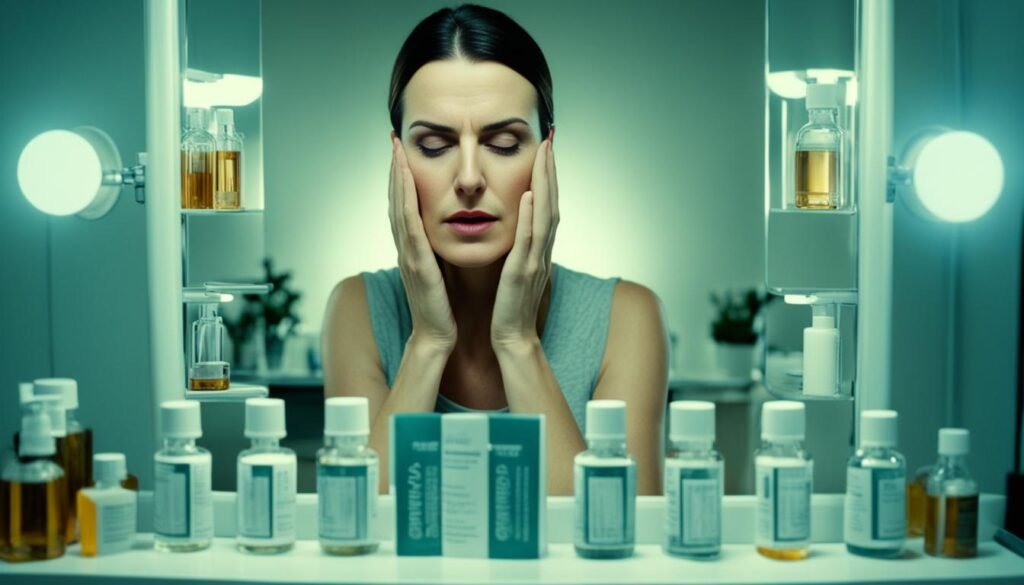
Alcohol consumption can have a significant impact on the immune system, compromising its ability to defend against harmful pathogens and increasing the risk of developing life-threatening illnesses.
Several mechanisms contribute to the weakening of the immune system due to alcohol:
- 1. Decreased production of immune cells: Alcohol impairs the production of white blood cells, including lymphocytes, which play a crucial role in fighting infections.
- 2. Diminished antibody production: Alcohol inhibits the production of antibodies, which are essential for recognizing and neutralizing pathogens.
- 3. Inflammation and tissue damage: Excessive alcohol intake leads to chronic inflammation and tissue damage, which impairs immune response and healing.
This weakened immune system makes individuals more vulnerable to a range of life-threatening illnesses, including pneumonia and tuberculosis.
| Impact of Alcohol on the Immune System | Consequences |
|---|---|
| Decreased production of immune cells | Increased susceptibility to infections |
| Diminished antibody production | Reduced ability to fight off pathogens |
| Inflammation and tissue damage | Impaired immune response and delayed healing |
It is important to note that even moderate alcohol consumption can have an impact on the immune system. Therefore, individuals should be mindful of their alcohol intake and consider the potential consequences on their overall health.
The Potential Benefits of Red Wine on Skin Aging

When it comes to maintaining youthful skin, the relationship between red wine and skin aging is a topic that has garnered attention from researchers and beauty enthusiasts alike. Red wine, in moderation, has been hailed for its potential benefits due to its antioxidant properties.
Antioxidants, such as those found in red wine, play a crucial role in combating the harmful effects of free radicals in the body. These unstable molecules can cause damage to cells and contribute to the aging process.
“Red wine contains antioxidants called polyphenols, which are known for their potential health benefits.”
Polyphenols are a group of plant compounds found in red wine, among other sources. Studies have suggested that these antioxidants may have protective effects on the skin, helping to maintain its youthful appearance and slow down the visible signs of aging.
Research has indicated that moderate consumption of red wine may lead to improved cholesterol levels and the protection of blood vessels, which can have indirect benefits for skin health.
However, it’s important to note that the potential benefits of red wine on skin aging are associated with moderate consumption. Excessive drinking can lead to negative health effects and should be avoided.
The Potential Benefits of Red Wine on Skin Aging: Overview
| Benefits of Red Wine | Impact |
|---|---|
| Antioxidant properties of polyphenols | Potentially protect against the effects of free radicals and facial skin aging |
| Improved cholesterol levels | May benefit overall cardiovascular health, indirectly impacting skin well-being |
| Protection of blood vessels | May contribute to better blood circulation, promoting a healthy complexion |
While the potential benefits of red wine on skin aging are intriguing, it’s worth noting that the research in this area is ongoing. It’s important to consult with a healthcare professional before making any significant changes to your diet or lifestyle.
Furthermore, it is important to maintain a balanced approach to skincare by incorporating a comprehensive routine that includes sun protection, a healthy diet, regular exercise, and adequate hydration.
Alcohol and Medication Interactions
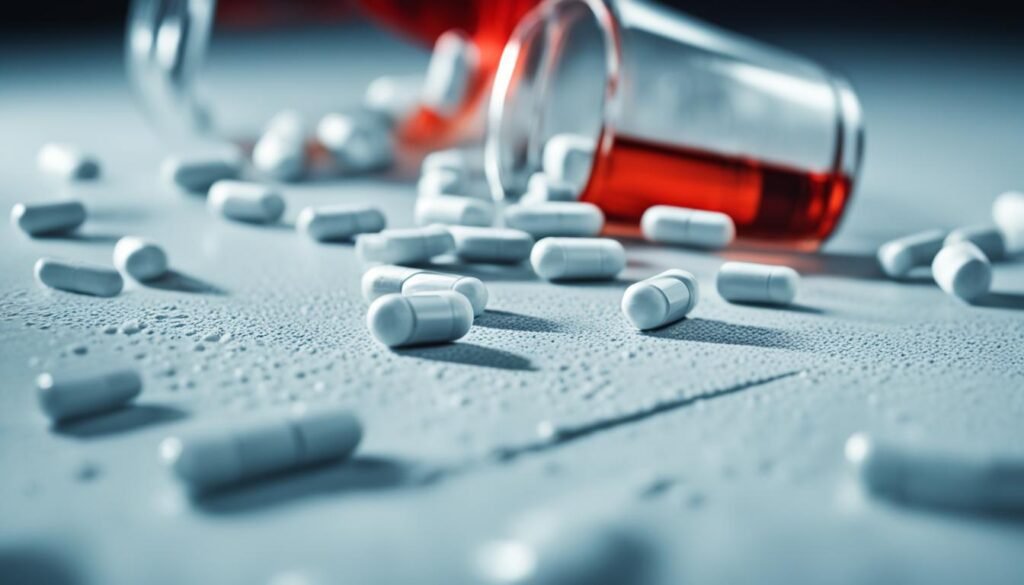
When it comes to consuming alcohol while taking medications, it’s important to tread with caution. Alcohol has the potential to interact with various medications, which can impact their efficacy and increase the risk of serious side effects. It is crucial to understand the potential interactions between alcohol and your medications to ensure your health and well-being.
Alcohol can interfere with the absorption, distribution, metabolism, and elimination of medications in the body. This can lead to altered drug levels, reduced medication effectiveness, and even unexpected adverse reactions. The specific interactions vary depending on the medication and individual factors, such as age, weight, and overall health.
Some medications may become less effective or ineffective when combined with alcohol. For example, alcohol can counteract the effects of certain antibiotics, anticoagulants, antidepressants, and anticonvulsants, among others. On the other hand, some medications may be potentiated or intensified by alcohol, leading to increased sedation, drowsiness, or other adverse effects.
It is crucial to consult your healthcare provider or pharmacist before consuming alcohol while taking any medications. They can provide you with personalized advice based on your specific medications and health conditions.
Additionally, it is essential to read the labels and packaging information of your medications carefully. Many medications include warnings and precautions about alcohol consumption due to potential interactions. Ignoring these warnings can have serious consequences.
Here are some general guidelines:
- Avoid alcohol entirely if your medication label clearly states that alcohol should not be consumed.
- If your medication allows for moderate alcohol consumption, it is still advisable to limit your alcohol intake and avoid excessive or heavy drinking.
- Certain medications may require you to abstain from alcohol for a specific period to allow for proper drug metabolism and elimination. Follow your healthcare provider’s instructions and guidelines closely.
Remember, the impact of alcohol on medication efficacy can vary from person to person. Factors such as the specific medication, dosage, frequency, and overall health can influence the extent of the interaction. Always prioritize your health and consult a healthcare professional to make informed decisions.
Interactive Table: Alcohol and Medication Interactions
| Medication Type | Potential Interactions with Alcohol |
|---|---|
| Antibiotics | Alcohol can reduce the effectiveness of certain antibiotics and increase the risk of side effects. |
| Pain Medications | Alcohol can increase the sedative effects of pain medications, leading to excessive drowsiness, dizziness, and impaired coordination. |
| Antidepressants | Alcohol can worsen the side effects of antidepressants, including drowsiness, dizziness, and increased risk of falls. |
| Anticoagulants | Alcohol can potentiate the effects of anticoagulants, increasing the risk of bleeding and other complications. |
| Anticonvulsants | Alcohol can interfere with the effectiveness of anticonvulsant medications, potentially increasing the risk of seizures. |
Note: This table provides a general overview and does not encompass all possible medications and interactions. Always consult your healthcare provider or pharmacist for personalized advice.
Alcohol and Falls in Seniors
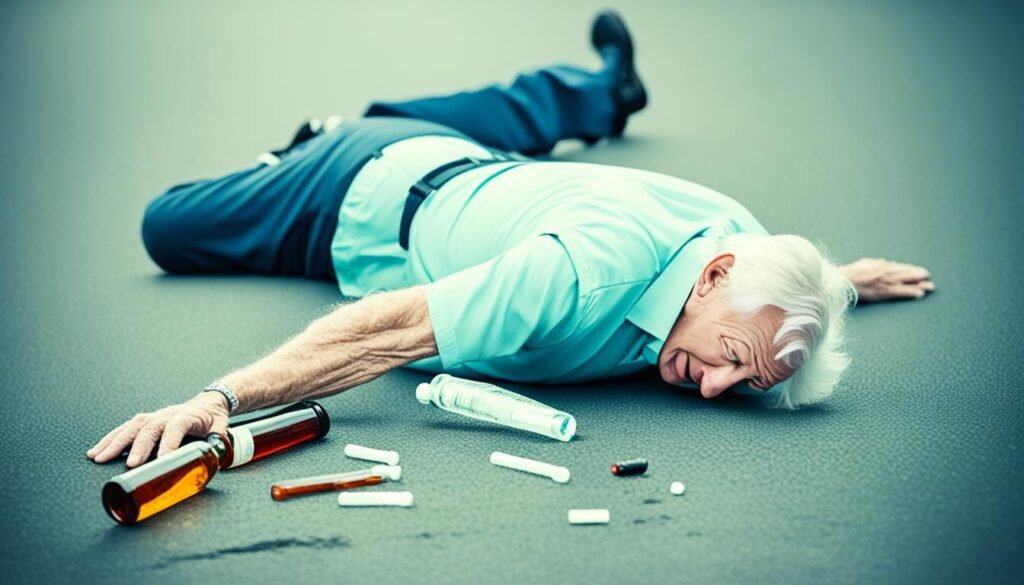
Heavy alcohol consumption can have a significant impact on balance and coordination, which can increase the risk of falls and fractures, especially in seniors. The consumption of alcohol affects the central nervous system, impairing the ability to maintain stable posture and equilibrium. This can lead to difficulty walking, unsteady movements, and a higher likelihood of stumbling or losing balance.
Alcohol interferes with the cerebellum, the part of the brain responsible for coordinating movement and maintaining balance. Excessive alcohol intake can damage the cerebellum, further compromising the ability to maintain a steady gait. As a result, seniors who consume alcohol excessively are at a higher risk of falling, leading to potentially severe consequences and injuries.
It is particularly essential for seniors to be cautious about alcohol consumption due to age-related changes in the body’s ability to metabolize alcohol. Aging bodies have a reduced tolerance for alcohol, making even moderate amounts more impairing than in younger individuals. Additionally, age-related changes in vision, muscle strength, and reaction times further exacerbate the impact of alcohol on balance and coordination.
Preventing falls in seniors is crucial for preserving their independence and overall well-being. By understanding the potential risks associated with alcohol consumption, both seniors and their caregivers can take proactive measures to reduce the likelihood of falls and related injuries. This may include reducing or eliminating alcohol intake, conducting regular balance exercises, maintaining a safe living environment, and seeking medical advice if alcohol consumption becomes problematic.
Key Points:
- Heavy alcohol consumption can impair balance and coordination, increasing the risk of falls in seniors.
- Excessive alcohol intake can damage the cerebellum, the part of the brain responsible for balance and coordination.
- Seniors should be cautious about alcohol consumption due to age-related changes that reduce alcohol tolerance and exacerbate the impact on balance.
- To prevent falls, seniors and caregivers should consider reducing alcohol intake, engaging in balance exercises, ensuring a safe living environment, and seeking medical advice if necessary.
| Factors Contributing to Falls in Seniors | Impact of Alcohol |
|---|---|
| Weakening of muscles and bones | Excessive alcohol consumption can impair muscle function and bone health, further increasing the risk of fractures. |
| Age-related changes in vision | Alcohol can affect vision, making it more challenging to detect obstacles or hazards that may contribute to falls. |
| Impaired reaction times | Alcohol slows down reaction times, making it harder to respond quickly and prevent falls in hazardous situations. |
| Medication interactions | Alcohol can interact with certain medications commonly prescribed to seniors, increasing their sedative effects and impairing balance and coordination. |
Conclusion
The research on alcohol consumption and its effects on the skin aging process has provided valuable insights. From the findings, it is evident that excessive alcohol consumption can have detrimental effects on skin health.
One of the significant impacts of alcohol on skin aging is dehydration. Alcohol can deplete the body’s natural water content, leading to increased skin dryness and potentially accelerating the aging process. Additionally, heavy alcohol use can cause organ damage, particularly to the liver, and impair brain health and immune system function. These adverse effects can further contribute to premature skin aging.
It is crucial to practice moderation and be mindful of the potential repercussions of excessive alcohol consumption. By maintaining a balanced lifestyle and keeping alcohol intake in check, individuals can protect their skin health and overall well-being. Protecting the skin from the harmful effects of alcohol is an important step towards promoting healthy aging and maintaining youthful-looking skin.
FAQ
Does alcohol consumption speed up the skin aging process?
Yes, multiple studies have shown that alcohol consumption can have negative effects on the skin’s aging process.
What is the impact of smoking on facial aging?
Smoking is associated with an increased severity of facial lines, under-eye puffiness, nasolabial folds, and reduced lip fullness. However, it does not impact forehead lines or crow’s feet.
What are the effects of alcohol on facial aging?
Heavy alcohol use is associated with increased upper facial lines, under-eye puffiness, midface volume loss, and visible blood vessels. However, it does not have an impact on forehead lines or crow’s feet.
How does alcohol affect skin dehydration?
Alcohol consumption can lead to increased dehydration in the body, which can have a negative impact on the skin.
Can alcohol cause skin dryness?
Yes, alcohol can dehydrate the skin, leading to increased dryness and potentially accelerating the aging process.
What are the potential impacts of alcohol on organ function?
Heavy alcohol consumption can lead to organ damage, including damage to the liver and impaired kidney function.
Does alcohol affect brain health?
Yes, chronic heavy drinking can lead to alcohol-related brain damage and certain types of dementia, impacting judgment, organization, emotional control, and focus.
How does alcohol affect the immune system?
Alcohol consumption can weaken the immune system, making individuals more susceptible to illnesses such as pneumonia and tuberculosis.
Are there any potential benefits of red wine on skin aging?
Red wine contains antioxidants called polyphenols, which may have some benefits for the skin. Moderate consumption has been associated with improved cholesterol levels and protection of blood vessels.
Can alcohol interact with medications?
Yes, alcohol can interact with various medications and affect their efficacy. It is important to be cautious when consuming alcohol while on medications.
Does alcohol increase the risk of falls in seniors?
Yes, heavy alcohol consumption can affect balance and coordination, potentially increasing the risk of falls and fractures in seniors.
What are the main findings on alcohol and skin aging?
The research indicates that alcohol consumption can have negative effects on the skin aging process, including dehydration, dryness, impacts on organ function, brain health, and immune system weakening.

